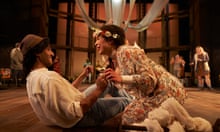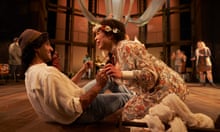For the first time in its history, all plays in the Royal Shakespeare Company’s new season at its two main theatres will be directed by women.
On Tuesday the company announced its summer 2018 season, with a directorial lineup of Polly Findlay, Erica Whyman, Fiona Laird, Maria Aberg and Jo Davies.
The RSC’s artistic director, Gregory Doran, said it was not a deliberate act but part of a process whereby they had “reached a point where those women directors had been with us and had grown, developed”.
Equal representation for women in theatre is one of the liveliest debates in the sector and strides have been made in addressing what were often shocking imbalances. But many believe more changes are needed.
Michelle Terry, the recently appointed artistic director of Shakespeare’s Globe, has promised a 50:50 gender balance on stage across a season.
Doran said his autumn 2018 production of Troilus and Cressida would be the first RSC production of a Shakespeare play that had a 50:50 split, but he said he would not be following Terry’s wider ambition.
“I don’t want to impose that on directors, it might mean we couldn’t do an all-female production. I want to keep it much more fluid and much more organic than that.”
The season will include a production of Macbeth directed by Findlay, with Christopher Eccleston in the lead role, making his RSC debut.
Doran said the actor had contacted him more than two years ago asking to play the part. “It is one of those roles which is difficult to cast,” he said. “We don’t breed Macbeths much in this country and it is great to have someone of his clout and his talent. There is something about the mind and the grit of Chris Eccleston that I think will be brilliant in that play.”
Whyman, the company’s deputy artistic director, will direct Romeo and Juliet, which she said should be seen as a political play “about a group of grown ups who have let their young people down quite profoundly”.
While audiences may read the play’s 2018 setting as a commentary on Brexit, Whyman said the politics of the moment would not be directly mentioned. “There will be an emotional analogy rather than a direct one.”
The third new production in the Royal Shakespeare theatre will be The Merry Wives of Windsor, directed by Laird and starring David Troughton as Falstaff.
Doran said the plays were deliberately three of Shakespeare’s most popular as part of a string of RSC initiatives to to encourage a passion for Shakespeare in young people.
In the Swan theatre, Whyman will direct a musical based on the life of one of the 20th century’s most influential and troublemaking theatre directors, Joan Littlewood; Aberg will direct a new production of Webster’s The Duchess of Malfi; and Davies will direct a play by a writer lost to history, Mary Pix.
Doran said her play The Beau Defeated emerged because of an RSC workshop trying to uncover female playwrights from the late 17th and 18th centuries who had been “shamefully disregarded”. A comedy of manners, it will be retitled The Fantastic Follies of Mrs Rich.
The company is also the subject of frequent protests because, like the British Museum and Royal Opera House, it takes sponsorship money from BP.
Doran said it was money that was needed. “In the economy we are in it is very difficult to unpick what is ‘good’ money ... if you can answer me that question I’d be delighted.”










